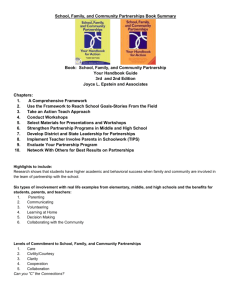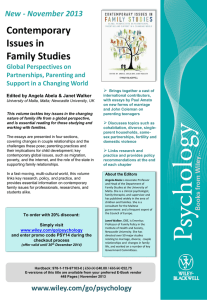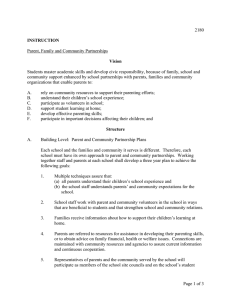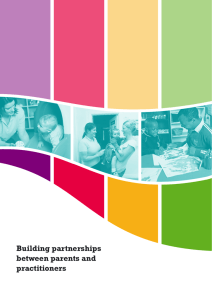Centre for Family Studies Malta 15 December 2010 Looking to the Future
advertisement
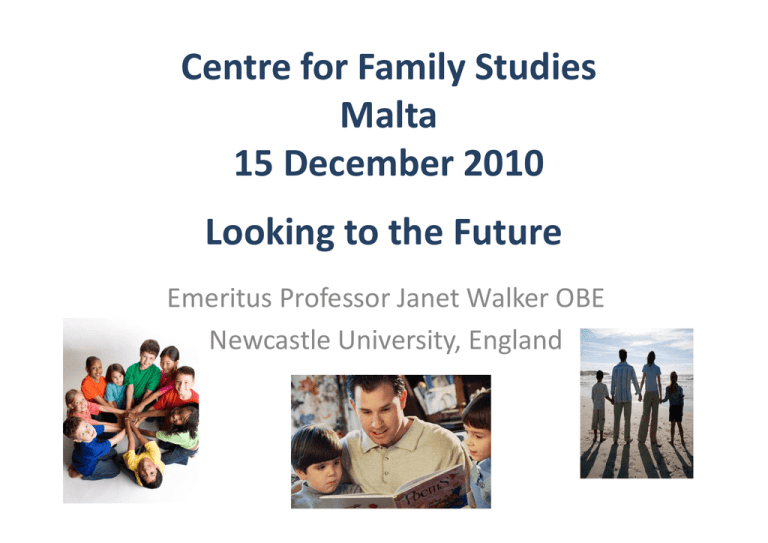
Centre for Family Studies Malta 15 December 2010 Looking to the Future Emeritus Professor Janet Walker OBE Newcastle University, England Families are the bedrock of society. They nurture children, help to build strength, resilience and moral values in young people, and provide the love and encouragement that helps them lead fulfilling lives. Changes in family life across the western world: Fertility rate cohabitation single parenthood separation and divorce stepfamilies same-sex partnerships employment of women periods of life spent outside conventional family unit As a result, societies are concerned about: family break-up instability – in families, communities and society poor outcomes for children the breakdown of traditional values how best to support parents and children Nevertheless – married couples = main type of adult partnership getting married is a key aspiration for most people – young people want to form a loving, committed relationship that will last for life Modern partnerships are: 1. Fragile 2. Strong Today most people: are living longer have increased opportunities and choice are healthier and more mobile face a range of moral and personal dilemmas have to take difficult decisions If families are to be supported and strengthened then we need the best possible knowledge about family life and relationships Malta Centre for Family Studies Research tells us about: the importance of couple relationships the complexity of family life the diversity of family forms The empirical research evidence indicates: enduring attachment to family ties continued commitment to family relationships tradition remains central to family values family connectedness is highly valued most people struggle to ‘do the right thing’ and to sustain the relationships that are important to them Research also tells us about the families in which children flourish: 1. Children thrive best in families characterised by predictable and consistent care. 2. Such care is associated with stable and harmonious relationships between parents. 3. Having parents who are able to maintain sound adult partnerships and negotiate flexibly is beneficial for children (and for parents). We need to understand the CHALLENGES families face in today’s society: balancing work and home parenting and child care caring for elderly or sick relatives satisfying the intimacy needs of partners reconciling tradition and globalisation changing economies and the PRESSURES unequal parenting roles no time to foster strong couple relationships no time to talk about things that really matter anxieties, tiredness, depression, disappointment, ill-health financial problems lack of secure employment The Centre for Family Studies can help us understand these challenges and pressures within the context of Maltese society. To support families, policymakers and practitioners need to understand: family relationships and family functioning different parenting styles child-development how to promote the well-being of parents and children the importance of good communication skills socio-economic influences on family life risk and protective factors The Centre for Family Studies can also inform difficult and sensitive debates and policy options: separation and divorce birth control domestic violence child abuse reproductive technologies By: weighing and presenting the evidence objectively providing a balanced viewpoint promoting informed discussion testing options, evaluating interventions and adding to knowledge locally and internationally Research in family life is likely to be judged on its: academic and intellectual merit robustness and replicability utility as a sound basis for policy and practice development Research in the Centre for Family Studies will need to be: multi-disciplinary – social sciences, health, education high quality – training and fostering skilled researchers via post graduate programmes and placements visible and high profile – consultancy can be provided to government(s); NGOs; businesses; family, health and education practitioners widely accessible – via academic papers, policy briefings and information for practitioners and families themselves ‘The outcome of any serious research can only be to make two questions grow where only one grew before.’ Veblen, The Place of Science in Modern Civilisation and Other Essays, 1919 It is important to remember that: research findings are always open to interpretation human behaviour is infinitely variable, extremely complex and often unpredictable there are unlikely to be simple solutions to social problems and dilemmas open debate about complex issues can assist in the development of evidence based policy and practice but not guarantee them the impact of research is often not immediate The welfare of families is a legitimate interest for all governments: the breakdown of family life has important economic, social and psychological impacts on individuals and society. Taking the long view It is essential to: define clear research questions address the fundamentals of family life be proactive be realistic take account of political imperatives develop academic networks across the globe Above all, the Centre will need to ensure a continuing and open dialogue with and between academic researchers, policymakers, practitioners, politicians, faith leaders, the business community and families themselves WELL DONE and GOOD LUCK


